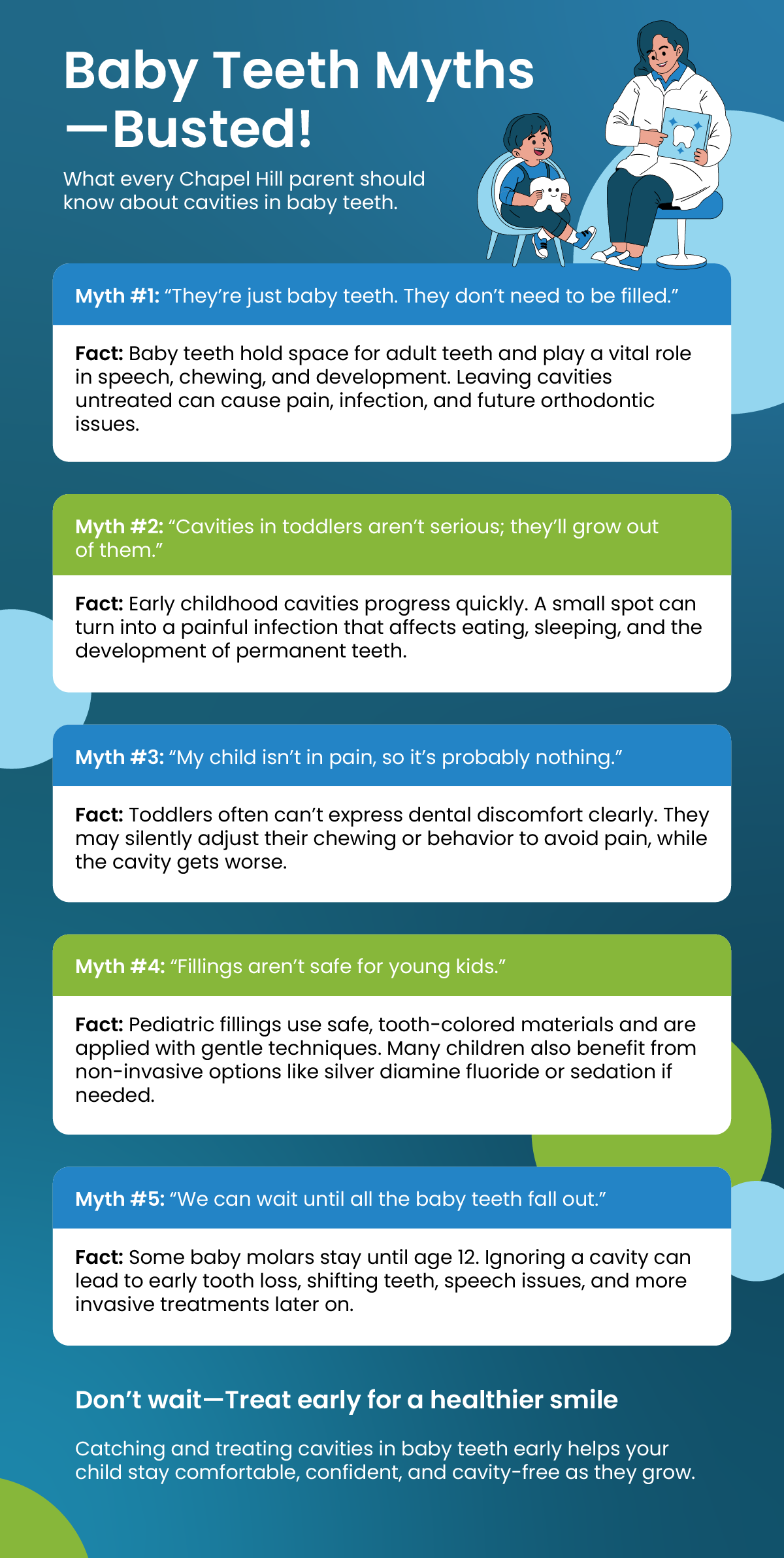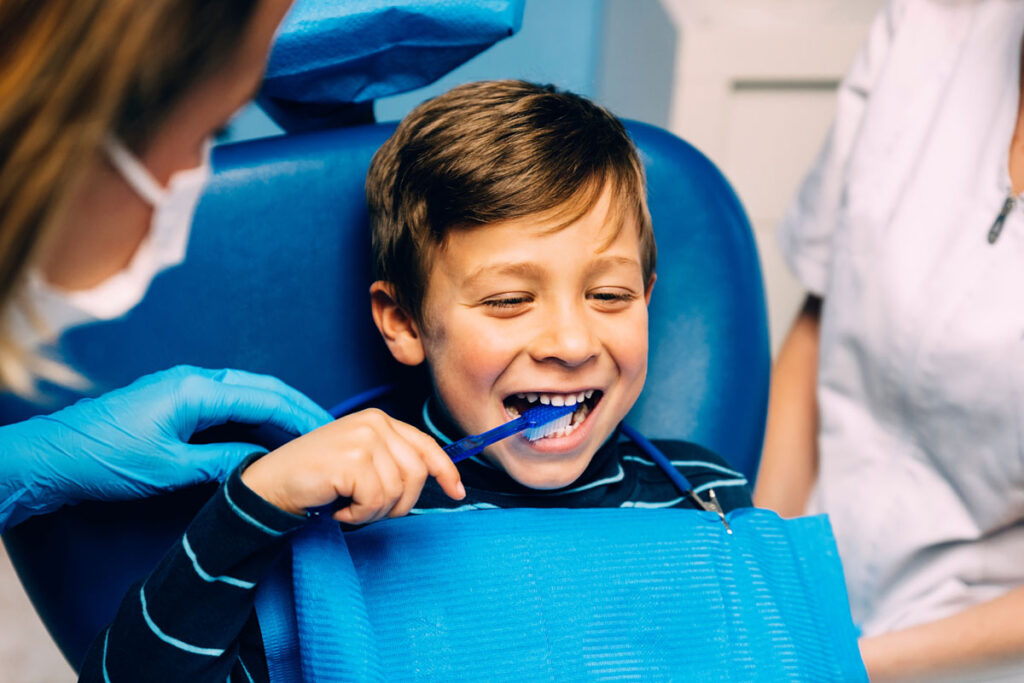Every parent wants the best for their child’s health, but when it comes to dental care, it’s easy to underestimate how important those little baby teeth really are. Maybe you’ve noticed a dark spot or your child mentioned tooth pain. Maybe you’re wondering whether it’s worth the stress of a dental visit if the tooth is just going to fall out anyway.
Here in Chapel Hill, we meet a lot of parents who ask the same thing: do cavities in baby teeth really need to be filled? Clifton & Mauney will walk you through the answer, clear up some common misconceptions, and help you feel more confident about your child’s oral health.
Are cavities in baby teeth a big deal?
If you’ve spotted a small brown spot on your toddler’s tooth, you might be wondering, does this even matter? Aren’t baby teeth going to fall out anyway? It’s a common question, and a completely understandable one.
The truth is, treating cavities in baby teeth in Chapel Hill isn’t just about preventing pain today. It’s about setting your child up for a healthier, happier future. Even though baby teeth are temporary, their health plays a big role in how your child eats, speaks, and grows.
So yes, cavities in baby teeth do matter. And getting them treated early can prevent much bigger problems down the road.

Why primary teeth matter more than you think
Primary (baby) teeth may only be around for a few years, but they serve some incredibly important purposes. First and foremost, they hold space in the jaw for the adult teeth that will come in later. If a baby tooth is lost too early because of untreated decay, it can cause permanent teeth to grow in crooked or crowded.
Baby teeth also guide your child’s speech development. They help with clear pronunciation and allow your little one to chew food correctly, supporting good nutrition and growth. If a toddler is missing back teeth or dealing with painful cavities, they might avoid certain textures or struggle with feeding altogether.
These teeth also affect confidence. A child with visible decay may hide their smile or avoid social situations. That’s why we emphasize comprehensive care for baby teeth, because they’re key to your child’s early experiences.
What happens if a cavity is left untreated
You might be tempted to wait it out, especially if your child isn’t complaining of pain. But early childhood cavities often progress quickly. What starts as a small spot on the tooth surface can turn into a deep infection within weeks or months.
Here’s what can happen if you delay care:
- Pain and sensitivity: Even if your child doesn’t mention it, they may be adjusting how they chew to avoid pain.
- Infection and swelling: Untreated tooth decay can lead to dental abscesses—painful infections that may require antibiotics or emergency treatment.
- Early tooth loss: When a baby tooth has to be pulled early, the neighboring teeth can shift, making future orthodontic care more complex.
- Impact on permanent teeth: A severe infection can affect the developing adult tooth below the gumline.
Dental infections in toddlers are more common than many parents realize. And because toddlers can’t always express what they’re feeling, the signs of a problem may go unnoticed until it’s more serious.
Want expert, compassionate care in Chapel Hill?
How we treat cavities in young children
At our Chapel Hill office, we take a gentle, age-appropriate approach to treating cavities in baby teeth. If your child is anxious or very young, we’ll explain every step in a calm, supportive way and adapt our treatment to their needs.
Depending on the severity of the decay, we might recommend:
- Fluoride treatment for early-stage decay (before a cavity has fully formed)
- Tooth-colored fillings that restore the tooth while blending in naturally
- Crowns for more severe decay, especially on back teeth that need extra strength
- Silver diamine fluoride, a liquid that can help slow down decay, which is ideal for some young children
You might be wondering, are fillings safe for toddlers? Yes. We use pediatric-safe materials and techniques, and your child’s comfort is always our top priority. We also offer options like laughing gas or in some cases, sedation dentistry, to ensure a stress-free experience.
For parents concerned about cost or complexity, we’re happy to walk you through what’s necessary and what can wait. Our goal is to prevent discomfort, protect your child’s future smile, and keep dental visits as positive as possible.
When to see a pediatric dentist
If you’ve noticed discoloration, sensitivity, or changes in your child’s chewing habits, don’t wait to get it checked. Baby tooth decay doesn’t reverse on its own, but early treatment can stop it from spreading.
And even if you’re not sure whether that spot is a cavity or just a stain, we can help you figure it out.
We’re proud to offer comprehensive care for baby teeth right here in Chapel Hill, whether it’s your child’s first visit or you’re seeking a second opinion. Our team is trained to work with toddlers, preschoolers, and children with sensory sensitivities or dental anxiety.
Do you still have questions? We’re here to help. Contact us to schedule a consultation, and let’s make a plan that supports your child’s healthiest smile.
Connect with our Chapel Hill team today
Whether you’ve already noticed signs of decay or just want peace of mind, now is the perfect time to take action. Our pediatric dental team is here to answer your questions, ease any fears, and provide the gentle care your child deserves.
Give us a call at 919.933.1007 or contact us online to schedule a consultation. We’re happy to walk you through your options and create a plan that fits your child’s unique needs. Your little one’s smile is in good hands at Clifton & Mauney.




